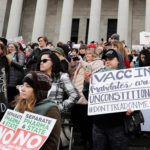 Recent research published in The Lancet highlighted the persistent opposition to vaccines, even as COVID-19 highlights their importance. Research from the University of Pennsylvania suggests that often these beliefs are fueled by misinformation, with this found to be more of a factor than education, political partisanship, or religiosity.
Recent research published in The Lancet highlighted the persistent opposition to vaccines, even as COVID-19 highlights their importance. Research from the University of Pennsylvania suggests that often these beliefs are fueled by misinformation, with this found to be more of a factor than education, political partisanship, or religiosity.
The research highlights how up to 20% of Americans have negative views about vaccines, with many of these views underpinned by fundamental misunderstandings about vaccination. The study was undertaken during the biggest measles outbreak in the country in a quarter-century. The researchers found that negative perceptions about vaccination understandably resulted in a much lower likelihood of support for mandatory childhood vaccines.
“The negative vaccine beliefs we examined aren’t limited only to the measles, mumps, and rubella (MMR) vaccine, but are general attitudes about vaccination,” the researchers explain. “There needs to be an education campaign by public health professionals and journalists, among others, to preemptively correct misinformation and prepare the public for acceptance of a COVID-19 vaccine.”
Overall support
Despite this often vocal minority, the researchers found strong support for pro-vaccination in general, with 72% of adults supportive of mandatory childhood vaccination. Despite this general support, however, the researchers believe a stronger public consensus is required to further support pro-vaccine attitudes and legislation so as to ensure community immunity.
While it is largely unknown what proportion of the community needs to be exposed to COVID-19 or be inoculated from it to achieve true community immunity, such attitudes towards vaccination are likely to be crucial at a time when many are hoping to hold on until a vaccine is released.
The negative perceptions held by participants towards vaccines was measured in terms of their belief that vaccines caused autism, were full of toxins, or that developing natural immunity is superior.
Social spreading
An early study from the university found that social media was a key channel for the spreading of misinformation about vaccines. The data revealed that around two-thirds of people were less informed in autumn than they were in spring, and the researchers believe that media consumption patterns are a contributory factor.
It emerged that those most likely to suffer from greater misinformation were exposed to more information about the MMR vaccine on social media. By contrast, those who primarily heard about measles and the vaccine through other channels became more informed.
“People who received their information from traditional media were less likely to endorse anti-common vaccination claims,” the researchers explain.
The accusation that social media is awash with misinformation is nothing new, but the scale, and speed, of misinformation is still worrying. The data showed that not only does people’s knowledge worsen after exposure to social media, but their level of trust in experts also diminished. This in turn coincided with believing misinformation about vaccines.
The data suggests that the extensive information campaign by the CDC was largely ineffectual at changing people’s awareness and understanding of the vaccine. Indeed, among those whose knowledge changed between spring and autumn, most suffered a decline.
While the findings are a case of correlation rather than causation, the researchers believe they are nonetheless important for policy makers to ensure the effectiveness of public health campaigns. They also underline the importance of recent decisions by various social networks to either reduce or block access to misinformation about vaccines.